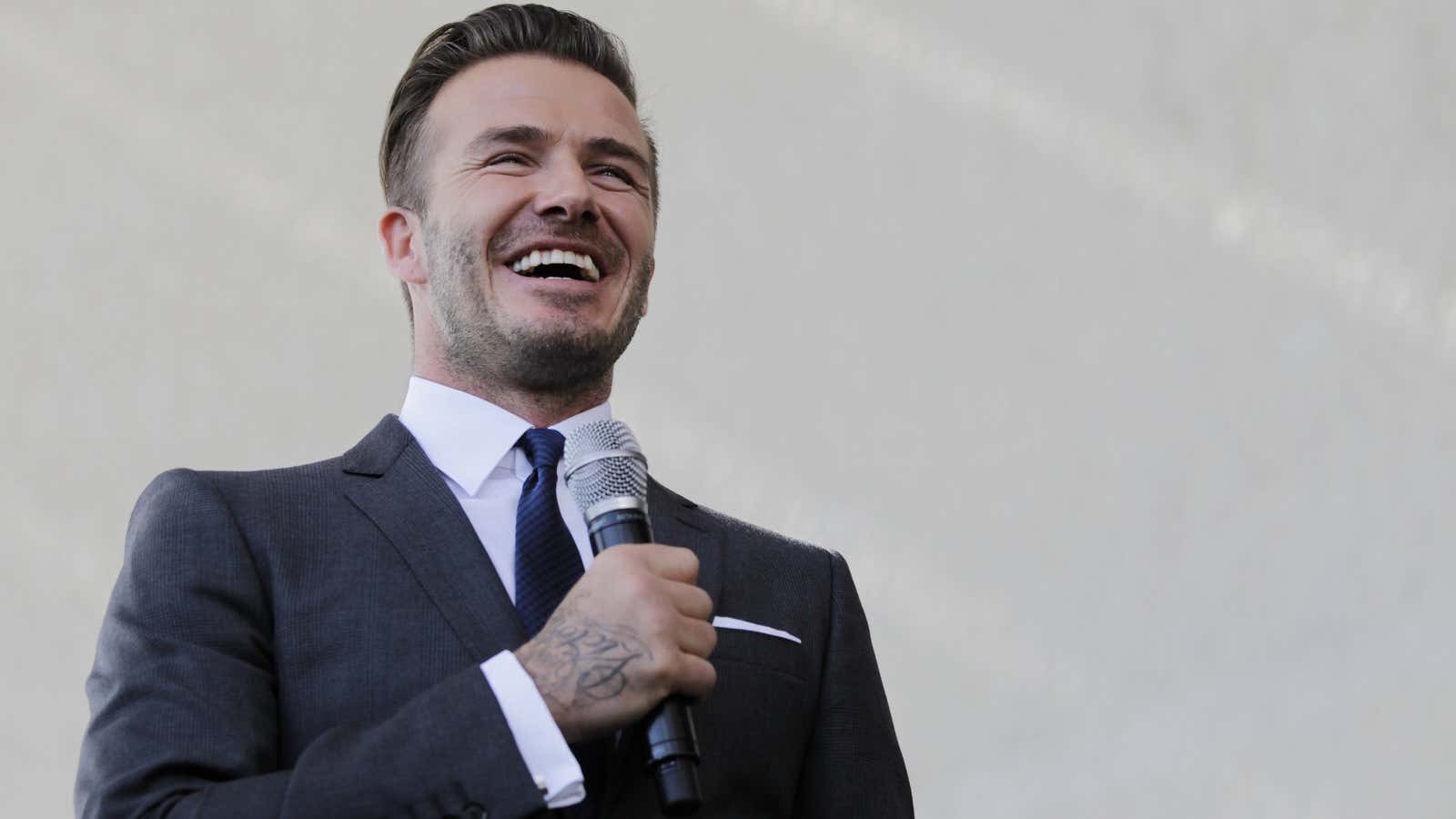Beckham is back.
Just a year after he played the last of his 118 matches for Major League Soccer’s LA Galaxy, the man known affectionately as Goldenballs, has announced a plan to launch a new soccer team based in Miami. Rumors about the deal have been making the rounds for months, including the potential involvement of NBA local LeBron James, but the idea is much older than that. In 2007, Beckham reportedly negotiated a clause into his playing contract with Galaxy that would allow him to buy a new franchise for the MLS for a cut-down fee of $25 million.
For now, further details on the deal are scarce. Beckham and his backers need to find a site for a purpose-built stadium, a team name, and some players. They also need to buck some trends. History tells us that Florida is a graveyard for soccer success. To make a return on his investment, Beckham must do better than 40 years of attempts to bring a soccer club to Florida:
Miami Toros, 1972-76
The Toros, who played in the North American Soccer League, weren’t even Miami natives: they migrated south from Washington, DC. Their four seasons were remarkably turbulent, encompassing two chairmen and three different grounds. While sharing the Orange Bowl with the NFL team, the Miami Dolphins, the Toros reached their pinnacle: losing the 1974 Championship match. Even with some relative success in the league, the crowds rarely reached more than 5,000 and the team was soon rebranded as…
Fort Lauderdale Strikers, 1976-83
…the Fort Lauderdale Strikers. The Strikers made a more successful showing of soccer in Florida than the Toros, mostly through a more ambitious recruitment strategy. English World Cup-winning goalkeeper Gordon Banks, Northern Irish hellraiser George Best, and German forward Gerd Muller were all part of the team in its seven-year history, boosting crowds into the low five-figures. Muller’s goals propelled them to a second-place finish in the Championship in 1980, but by 1983 owner Joe Robbie admitted defeat and moved the team north to Minnesota. A year later, the league collapsed, eventually to be replaced by…
Miami Fusion, 1997-2002
…Major League Soccer. A competitive league was revived in the hope of maximizing the nascent interest in soccer generated by hosting the World Cup in 1994. However, the league is reported to have lost $250 million in its first five years as sports fans remained wedded to a diet of baseball, basketball and football. Despite winning the Eastern conference in 2001, and having the lowest ticket prices in the country, Miami Fusion was shut down by the league months later. Fusion’s owner, Ken Horowitz, said that the area’s migrant population meant that there was “trouble identifying with the local sports teams.” At the same time…
Tampa Bay Mutiny 1995-2001
…Tampa Bay Mutiny made a lightning start, winning the first Supporters’ Shield (for the team with the best points record), thanks to Colombian midfielder Carlos Valderrama and league top-scorer Roy Lassiter. However, the Major League Soccer team moved to a new stadium in 1999 with an expensive league agreement. Subsequently crowds dipped, Valderrama and Lassiter were sold and results deteriorated. In 2002, Tampa Bay was folded at the same time as Fusion.
Fourteen years later (and sans soccer teams), Beckham must contend with expensive waterfront real-estate and troublesome demographics that remain an impediment to maintaining a committed fan base. That said, the league is now in a far stronger financial position than it was a decade ago, and television revenue and attendances are rising. International and exhibition matches in the city in 2013 saw crowds north of 65,000. But the biggest difference is Beckham himself. His combination of Hollywood looks, corporate contacts, and MLS experience gives the project added credibility. He would have little difficult filling a dressing room with recognizable players, and the project has already attracted funding from entertainment impresario Simon Fuller and a Bolivian telecoms tycoon, Marcelo Claure. A year ago Beckham left LA as a play-off winner; he is unlikely to tolerate losing in Miami.
